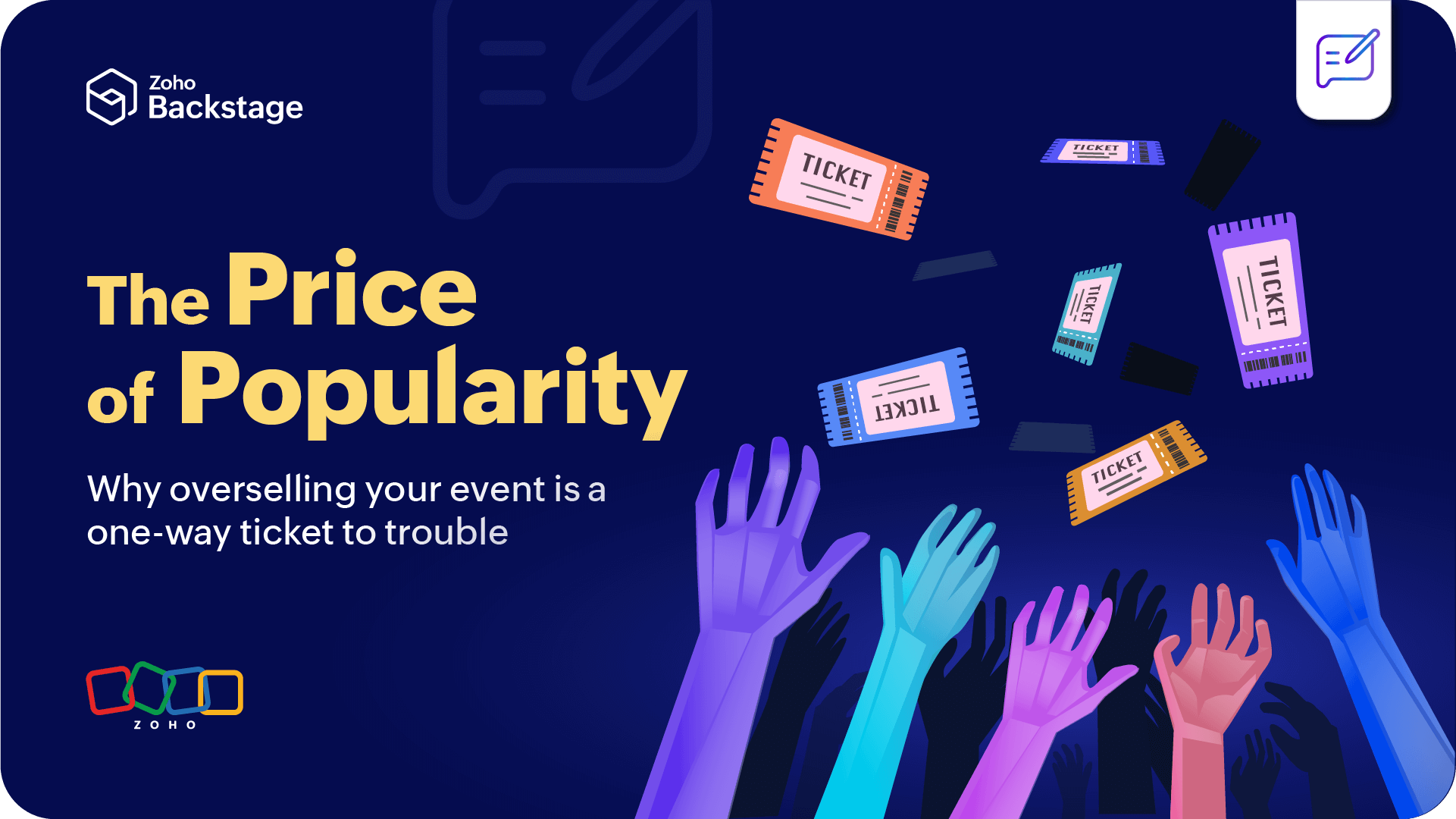How to rank on Google: 10 SEO tips for event professionals
- Last Updated : August 18, 2023
- 3.5K Views
- 8 Min Read

Ask a group of marketers what they think is the number one way to increase website visibility and traffic and you’ll have a roomful of voices chorusing Search Engine Optimization (or SEO as it’s commonly called).
But what actually is SEO? Simply put, it’s optimizing your website—code and content—to ensure it ranks high on Google for certain searches (keywords). And why is it important? Because more than half the world uses Google’s search engine to get information, and the higher in Google’s search results you appear, the chances of people visiting your website increase exponentially.
Today, almost every event has an event website, and by getting it to rank high on Google (ideally, in the first two search result pages), you can increase the reach of your event and get more people to register for it. In this post, we talk about 10 ways you can optimize your event website for Google Search.
Get your keywords right
In SEO-speak, a keyword is a word or short phrase that matches the words or phrases people use when they search for information via a search engine (more particularly, Google Search). By including keywords that people are actually using to search for the type of information you provide (as opposed to just guessing what someone might use), the easier it’ll be for Google to identify your content and show it to people searching for related information.
So how do you know what these keywords are and which ones are right for you? By researching them. You can use tools like Moz Keyword Explorer or Google Keyword Planner to do this. Once you’ve made a list of possible words and phrases (these are called long-tail keywords), you can use an SEO tool to figure out if they’re appropriate for your event website. Here are some parameters to analyze:
Search volume: On average, how many people use the phrase in their searches?
Level of competition: Are a lot of people using the keyword? If so, it’ll be harder for you to rank high.
Region: Does the keyword rank high in the regions where your target audience lives.
Finally, keep in mind that Google penalizes websites that stuff their content with too many keywords, so avoid using them unnecessarily or out of context.
Show up on mobile searches
A study by techjury says a little more than 50 percent of internet traffic happens through mobiles. Also, Google is separating mobile and desktop into different indexes with the former as the primary one. So even if someone searches on their computers, the mobile version will be used. Here are five ways you can optimize your event website for Mobile Search:
Design a website that's responsive to screens of varying sizes
Ensure that you don’t block images, Java, or CSS on the mobile site
Avoid user interface (UI) elements like pop-ups that are not user-friendly on mobile phones
Use Accelerated Mobile Pages (AMP) markup for your event websites
Compress all images to increase the page-loading speed
Since a lot of these tips also help your search ranking on desktop searches, it’s a double benefit for you.
Improve your domain’s authority
Google places a lot of value on “domain authority,” a measurement it uses to judge if it can trust your website or not. The higher your domain authority, the more trustworthy your event website. While there’s no one way to improve your domain authority, you can use Google Analytics to gauge it.
Also, if you’re using a third-party ticketing vendor, their reputation will add to your event website’s domain authority, improving it significantly. An HTTPS website will also help here, so be sure to get an SSL certificate for your event website. If you’re using an event management tool to host your event website, ask them if they provide SSL certificates for custom domains.
Another way to increase your domain’s authority is by getting reputed people with websites of high domain authority—speakers, sponsors, affiliates—to link to the website. These are called backlinks and will definitely benefit you.
Subscribe to The Green Room
Sign up here and get all the most relevant MICE industry content delivered right to your inbox once a month.
By submitting this form, you agree to the processing of personal data according to our Privacy policy.
Don’t forget accessibility (and ALT text)
Alt-text is the text you enter to describe the image elements on your event website. Screen readers use them to read out a description of the image to visually impaired people. Alt text also benefits you in another way. Bots that crawl your website can’t understand the images either, so they will use the alt text to see if your website is relevant. This means using alt text can definitely benefit the search ranking of your website. For video content, on the other hand, you can use closed captioning and add transcripts to improve accessibility. So don’t forego digital accessibility when building your website—not only do your attendees benefit from it, you do too.
Build a structured website
Website structure is an important part of SEO. A good website structure means the content is organized and categorized, there are no dead or broken links, and the UX is intuitive, making it easy for visitors to navigate the site and find the information they require. This will also help Google index your content correctly. If you have too much repetition in your content or it appears in too many places, you can confuse Google and end up competing with your own website for search rankings.
Once you have a structure in place, you can submit it to Google by generating a sitemap and registering with Google Webmaster Tools. If you’re building your website with a website builder like WordPress, Wix, or Zoho Sites, the sitemap will be generated automatically. This process is especially important if your website has images and videos, as Google uses sitemaps to understand them. It also speeds up indexing, as Google knows about all the URLs on your website.
Leverage your event ticketing platform
Chances are the event management software or event ticketing platform you use already has a good SEO advantage. They must have already done their research to ensure maximum search visibility. When you list your event on their platform, you’ll be asked to add keywords or tags. Once you add the necessary keywords, your event will automatically rank for those keywords, making it easy for prospective attendees to find you.
They also take care of the technical side of the website, be it AMP (for better visibility during mobile searches), user-friendly website navigation, or even website security. This not only makes your work easier (especially if you aren’t from a technical field), it also means you don’t have to spend money on a professional. You can take care of everything by yourself.
Plan for local ranking
A key point to consider—particularly for event websites—is ranking high locally. Why is this important? Attendees will be more open to registering for an event that is nearby than half a continent away. One way to do this is by mentioning the location in your event title. For example, Zylker Summit: Miami. You can also use keywords that are local to the area like “leadership summit in Miami,” as people are more likely to search that way.
You can also use event markup to get listed in Google’s event pack, right on top of the page for search results like “concerts this weekend” or “workshops in Florida.” This is triggered by event-based searches and gives your event the opportunity to rank at zero, even above the first search result. Another option is getting ranked in Google’s event carousel. This is also above the organic search results. Both these options are part of the Google event experience and go a long way in making your event visible to attendees. If your ticketing partner is already participating in the event search experience, you’ll be automatically listed.
Optimize your website copy for SEO
When it comes to SEO, content is quite possibly the most important aspect. That’s why it is important to ensure your website copy has all the essential information. Leverage keywords when mentioning information like the event name, event description, event schedule, and speaker and session descriptions. You can also get your speakers and sponsors to write content for your website as blogs. These can be a short preview of their session, educational content from sponsors, or even interviews with key members of your team.
Ensure that all content is of good quality, helpful for users, and relevant to the target market your event attracts. You should also add headings, make sentences short, and use simple words. Why? Google uses the Flesch Reading Ease Score to measure your content’s readability. If your content is easy to read and understand, then Google suggests it to more people.
Have a relevant title and meta description
The page title and meta description are short snippets of HTML code found in web pages. They are essentially used as a preview to your event website and will be displayed on search results to give people an idea of your event page. Having a relevant keyword-rich title and description is important for two reasons:
It helps Google identify your website easily and increases your search ranking
It tells people what your event is about so they actually click the link and visit your site
The ideal length of the meta description is 100-150 characters. If it’s too long, it might get cut out, especially in mobile searches, so keep it short.
Include event schema
Event schema markup is a type of code that helps search engines understand your event better. Basically, instead of just presenting the information on the website, you’re adding context to it to ensure the search engine understands it correctly. Not only does event schema help crawlers index your website correctly, but it also help them provide more contextual information on the search results page so more people are likely to visit your website. Another benefit of event schema is that they help with voice searches. These are the schema markup properties you have to include in your web page:
Location
Detailed address of the venue
The full title of the event
Event description
Start date (in local time zone)
Event attendance mode (this is especially important with the rise of online and hybrid events)
You can use Google’s Structured Data Markup Helper to add event schema markup to your website.
With digital marketing more prominent than ever, it’s imperative that event professionals have a strong SEO game plan. A lot of these tips are common to all websites, so if you have a personal website or a website for your event planning agency, you can definitely use them to increase their Google ranking too. And that’s really advantageous, as it builds brand awareness and makes it easier for clients to find you.
If, like us, you're more of a social person, let's connect on Twitter (@ZohoBackstage) and we'll keep you up-to-date with all the latest event news.
 Nisha
NishaMarketing and content at Zoho Backstage. Cultural misfit. Armchair traveler. Productivity geek. Sometimes, I write poetry. Sometimes, it rhymes.









Comments(1)
This Is Awesome! Everytime I see you have new content the first thing I do is put the kettle on for a coffee 🙂 What technique would you recommend If you have quality content that is getting published every week? Keep up the good work.